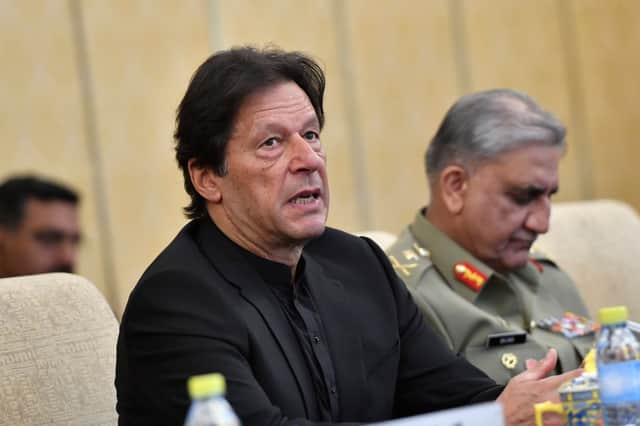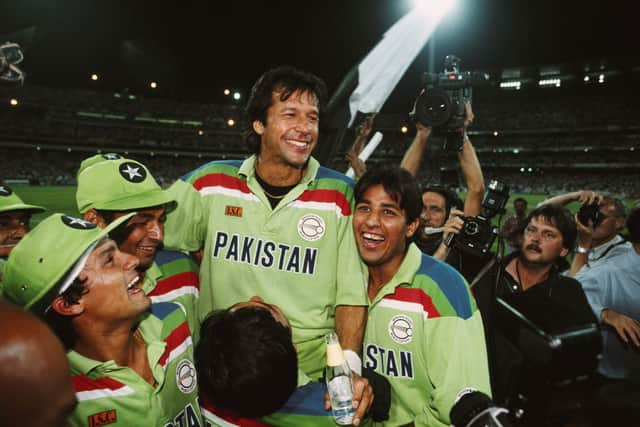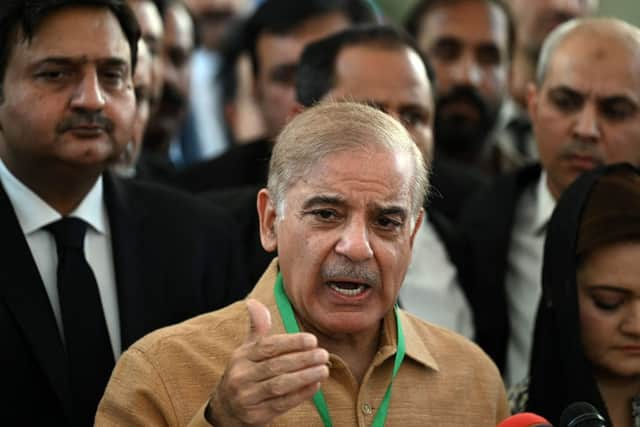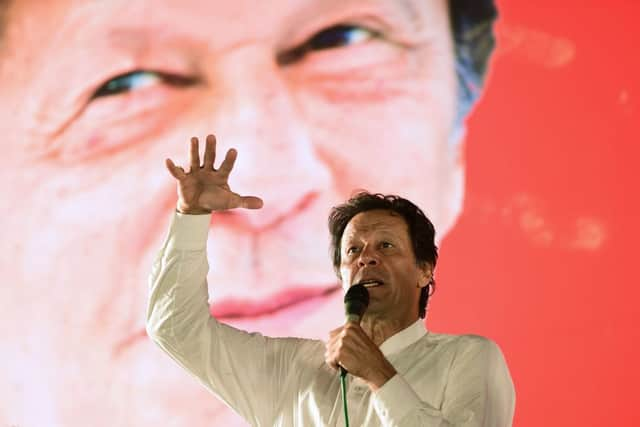Who is prime minister of Pakistan? Why Imran Khan was ousted, what happened, will Shahbaz Sharif replace him


After a week of political turmoil, which saw prime minister Imran Khan ejected as leader, the Pakistan parliament is choosing its new premier.
Khan, the country's former cricket star turned politician, was ousted over the weekend following a no confidence vote, which he attempted to block.
Advertisement
Hide AdAdvertisement
Hide AdThe Pakistan Supreme Court ruled that he had no legal footing to do so, however, allowing the vote to go ahead on Saturday, which saw Khan lose comfortably.
Two more seats than what was required - 174 votes from a 342 national assembly - meant Pakistan was looking for a new prime minister in a crumbling economy.
Shahbaz Sharif, brother of disgraced former PM Nawaz Sharif, as among the leading contenders to succeed Khan.
Here is everything you need to know.
Who is Imran Khan?
Before entering politics, 69-year-old Khan was an international cricketer and captain of the Pakistan national cricket team, which he led to victory in the 1992 Cricket World Cup.
Advertisement
Hide AdAdvertisement
Hide AdHe was also chancellor of the University of Bradford from 2005 to 2014. He came into power in elections in 2018, securing 176 votes.
His Tehreek-e-Insaf party won the most seats, but fell short of an outright majority. It allied with independents to form a coalition.
But his win was mired in controversy and widespread accusations that the army helped his party to victory.


Khan acquired a reputation as a playboy during his cricketing years but has embraced conservative Islam after entering politics.
Advertisement
Hide AdAdvertisement
Hide AdHis first wife was the wealthy British heiress Jemima Goldsmith, whom he married in 1996.
He married his second wife, British journalist Rehman Khan, in 2015, but they divorced within a year. In 2018, he married his spiritual adviser, Bushra Maneka.
Khan emerged as a critic of the so-called war on terror after the 9/11 attacks, accusing the US of fuelling extremism by carrying out drone strikes in Pakistan that killed civilians.
He has also expressed support for a controversial law that makes blasphemy against Islam punishable by death, and critics in Pakistan have branded him “Taliban Khan”, accusing him of sympathising with extremists.
Advertisement
Hide AdAdvertisement
Hide AdHe has denied those charges, saying he was committed to defeating Islamic extremists and cultivating good relations with the US, which for years has demanded that Pakistan do more to combat militancy.
Why did he face a no-confidence vote?
Pakistani opposition legislators launched a no-confidence motion against Khan in parliament on Monday 28 March, hoping to oust Khan’s government amid accusations he has mismanaged the nation’s economy.
Shahbaz Sharif, the opposition leader in the National Assembly or lower house of the parliament, proposed the no-confidence motion against Khan.
Shortly after his election victory in 2018, Khan said Pakistan was in the worst economic condition it had seen, and pledged to cut government expenditure, end corruption and repatriate public funds.


Advertisement
Hide AdAdvertisement
Hide AdThe opposition blames Khan for high inflation that is hitting households, but his government is also credited with maintaining a foreign reserve account of $18 billion (£14 billion), bringing in a record $29 billion (£22 billion) last year from overseas Pakistanis; Khan’s anti-corruption reputation is credited with encouraging expatriate Pakistanis to send money home.
His government had also received international praise for its handling of the Covid-19 crisis and implementing so-called “smart lockdowns” rather than countrywide shutdowns.
Why did he try to cancel the vote?
The opposition arrived in parliament ready to vote him out of power, and said they had the simple majority of 172 votes in the 342-seat assembly to do so.
But Khan’s information minister Fawad Chaudhry successfully filed a motion to the deputy speaker of parliament to have the vote thrown out.
Advertisement
Hide AdAdvertisement
Hide AdKhan sought to justify the measures by accusing the US of trying to overthrow his government.
Khan has accused the opposition of being in cahoots with the US to unseat him, saying America wants him gone over his foreign policy choices that often favour China and Russia.
Khan has circulated a memo which he insists provides proof that Washington conspired with Pakistan’s opposition to unseat him because America wants “me, personally, gone … and everything would be forgiven”. He offered no concrete evidence of US interference.
Khan, who was not in parliament on Sunday, went on national television to announce he was submitting the dissolution request, which Pakistan’s President Arif Alvi later executed.


Advertisement
Hide AdAdvertisement
Hide Ad“Thank God, a conspiracy to topple the government has failed,” Khan said in his address. “I ask people to prepare for the next elections.”
Khan’s insistence there is US involvement in attempts to oust him exploits a deep-seated mistrust among many in Pakistan of American intentions, particularly following 9/11.
Washington has often berated Pakistan for doing too little to fight Islamic militants, even as thousands of Pakistanis have died at their hands and the army has lost more than 5,000 soldiers.
Pakistan has been attacked for aiding Taliban insurgents while also being asked to bring them to the peace table.
What happens now?
Advertisement
Hide AdAdvertisement
Hide AdAccording to Pakistan’s constitution, an interim government inclusive of the opposition will now see the country towards elections held within 90 days.
But the move has led to unrest, and it is unclear where the country’s military — which has directly ruled Pakistan for more than half of its 75-year history and has a history of overthrowing successive democratically elected governments and indirectly manipulating others from the sidelines — stands.
In the capital Islamabad, security forces braced for the worst, locking down much of the city as a defiant Khan called for supporters to stage demonstrations countrywide.
Giant metal containers blocked roads and entrances to the capital’s diplomatic enclave, as well as parliament and other sensitive government installations.
Comment Guidelines
National World encourages reader discussion on our stories. User feedback, insights and back-and-forth exchanges add a rich layer of context to reporting. Please review our Community Guidelines before commenting.
